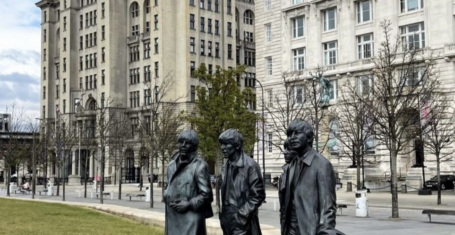
It’s time for The Guild to disaffiliate from the NUS
Is the confederation really representative of Liverpool’s student population?
Last week, the National Union of Students held a conference where delegates from all universities affiliated with the NUS met together in Brighton to vote on new policy, and decide who should be their new president. Are you wondering why nobody told you that the organisation that in part controls what our Guild can and cannot do, was holding an election? And why we weren’t even offered a chance to vote in it?
The NUS is not a direct democracy. The Liverpool student body elect 6 people to act as delegates who supposedly convey our opinions at any NUS conference. We are rarely consulted with, or asked for our opinions.
According to the Guild’s own website, only 1,136 students voted in our most recent election of NUS delegates; a tiny amount when compared to the 7,450 students that voted in our most recent officer election, and minuscule when you consider that there are 22,000 students at the uni.
This process wouldn’t be much of an issue in practice if the NUS had not become such a controversial organisation that many Liverpool students seem not to relate with it. Below is a list of some of the bordering-on-insane things that have come out of the NUS in recent years, and what they mean for Liverpool Guild of Students.
Applauding a delegate who called for us to end holocaust memorials for not being inclusive enough
This only happened at the NUS’ most recent conference last week. A delegate from Chester University took to the stage to address her colleagues, saying “I am against the NUS ignoring and forgetting other mass genocides and prioritising others” to the delight and applause of the audience. At what point in the push for inclusion and diversity has it become acceptable to suggest ceasing commemoration of one of history’s worst atrocities?
Electing a president that refuses to condemn ISIS and has been accused of making anti-Semitic remarks.
Malia Bouattia was recently elected the new president of the NUS, despite allegations of a history of anti-Semitism, as well as voting against a motion to condemn the terror acts committed by ISIS as she considered such a move to be “Islamophobic”. She described Birmingham University as “something of a Zionist outpost in British Higher Education.” I’m going to hazard a guess and predict that most Liverpool students don’t feel particularly sorry for ISIS, considering that they frequently behead, and throw from the tops of buildings, those who oppose them. Malia has since denied these claims, but I’m not convinced. She says that her election “didn’t take place in a vacuum”, but I cannot for the life of me think of anything more an of an ideological vacuum than the NUS.
Asking delegates to use jazz hands instead of clapping as it may be “triggering” to students.
This incredible request came from last year, where a tweet was made from an official NUS twitter account stating: “Some delegates are requesting that we move to jazz hands rather than clapping, as it’s triggering anxiety.” Is it wrong of me to doubt that a delegate who finds clapping to be emotionally ‘triggering’ is able to fight for my concerns at a national conference among hundreds of other people? By the time it comes around to our graduations, we’ll have a Guild full of people shimmering their hands like clowns at this rate.
Voting to ban anonymous messaging apps such as Yik Yak in order to create ‘safe spaces’.
Safe spaces, for the unaware, are essentially where emotionally fragile students can go to avoid all those nasty ‘opposing viewpoints’ or ‘rational discussions’ and instead be surrounded by like-minded buffoons, and fluffy toys. The rise of safe space culture has been heavily criticised by prominent academics and intellectuals including the likes of Richard Dawkins and Stephen Fry, as well as by Dr Cheryl Hudson, a history lecturer at Liverpool University, in this co-authored letter to The Telegraph, which argued that the atmosphere in British universities was “killing free speech”. Don’t we come to university to hear about and interrogate new ideas, not lock ourselves away from them? Besides, Yik Yak has a voting system where the worst submissions are deleted anyway; it’s rare to see anything offensive scoring positively in Liverpool.
The ‘No Platform’ policy designed to deprive those with unpopular opinions a platform to speak.
The NUS might have had ultimately good intentions with this one, but it has devolved into a censorship-happy mess, which would happily see universities become giant echo-chambers. A couple of days ago, it was even suggested by a UK barrister that the policy might be illegal in all cases except when used against members of a proscribed group such as terrorists. It’s no secret that the NUS is dominated by those who identify as somewhere on the ‘left’ of the political spectrum, and that wouldn’t be such a big issue, were they not so opposed to allowing people of differing political ideologies the chance to make their argument. Equal rights for LGBT+ individuals used to be an unpopular opinion, and maybe it still would be if we allowed such a ridiculous policy to exist back then.
It’s a struggle to find a net benefit coming from The Guild’s association with the NUS. They used to provide us with a stronger voice when fighting for the issues of students, but now they’re turning us into a laughing stock. The mainstream media are beginning to take note of the various blunders that they have been involved with, and it reflects badly on all students.
If the Guild disaffiliates from the NUS, it will send a message that we are a university that encourages free speech, academic debate, and the discovery of new ideas. We support common-sense policy, and do not sacrifice our most fundamental educational objectives in the name of creating ‘safe spaces’.
We need to remember what coming to university is really for.









































